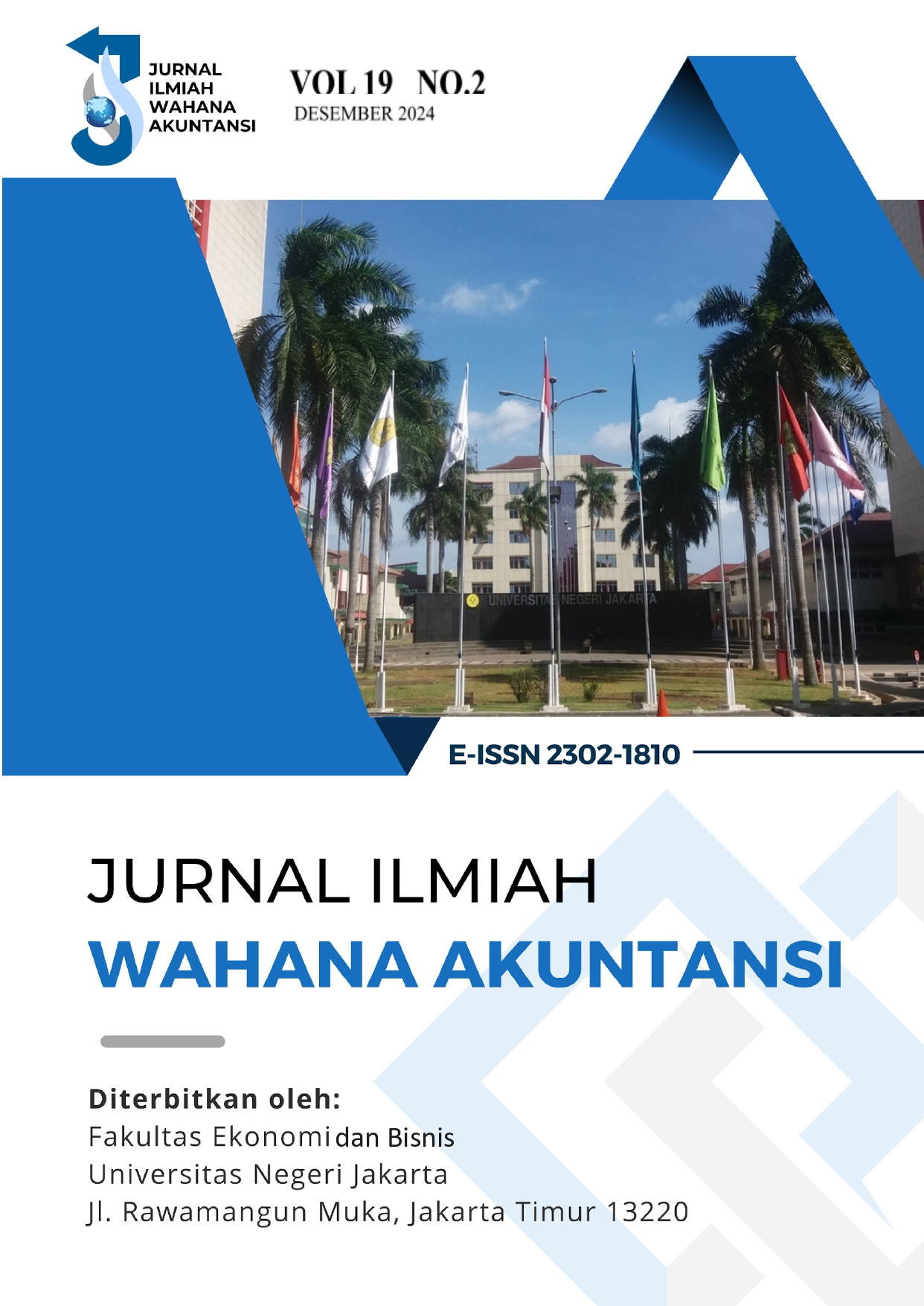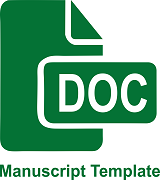Efek Digitalisasi terhadap Praktik dan Kualitas Audit: Perspektif dari Studi Literatur
DOI:
https://doi.org/10.21009/Wahana.19.029Keywords:
Auditing, Audit Quality, Audit Practice, Challenge, DigitalizationAbstract
Digitalization has become a major driver in business and organizational transformation in the contemporary era. One area that is significantly affected is audit. This study aims to explain the effects of digitalization on audit practice and quality using libraries or qualitative literature study methods using related journals or scientific articles. This study produces findings that digitalization provides benefits such as efficiency and accuracy which have a positive effect on audit practice and quality. However, there are also challenges such as data security, privacy issues and changing skills paradigms. So, it is very necessary to have a careful strategy in dealing with these changes to ensure the sustainability and effectiveness of audit practices in the future. It is hoped that audit practices can exploit the positive potential of digitalization while overcoming existing challenges. As technology and the business environment continue to change, these efforts will ensure that audit practices remain relevant, effective, and competitive in the ever-evolving digital era.
References
Agoes, Sukrisno. (2017). Auditing (Petunjuk Praktis Pemeriksaan Akuntan oleh Akuntan Publik). Edisi 5. Buku 1. Jakarta: Penerbit Salemba Empat.
Anh, T. T. K., & Anh, H. H. (2021). Perception of digital transformation effect on audit quality: the case of Vietnam. Journal of International Economics and Management, 21(3), 91-107. DOI: https://doi.org/10.38203/jiem.021.3.0037
Bandaso, T. I., Randa, F., & Mongan, F. F. A. (2022). Blockchain Technology: Bagaimana Menghadapinya?-Dalam Perspektif Akuntansi. Accounting Profession Journal (APAJI), 4(2), 97-115. DOI: https://doi.org/10.35593/apaji.v4i2.55
Chan, D. Y., & Vasarhelyi, M. A. (2011). Innovation and practice of continuous auditing. International Journal of Accounting Information Systems, 12(2), 152–160. DOI: https://doi.org/10.1108/978-1-78743-413-420181013
Cristea, L. M. (2020). Emerging IT technologies for accounting and auditing practice. Audit Financiar, 18(4), 731-751. DOI: http://dx.doi.org/10.20869/AUDITF/2020/160/023
Elisabeth, D. M. (2019). Kajian terhadap peranan teknologi informasi dalam perkembangan audit komputerisasi (studi kajian teoritis). METHOMIKA: Jurnal Manajemen Informatika & Komputerisasi Akuntansi, 3(1), 40-53. DOI: https://doi.org/10.46880/jmika.Vol3No1.pp40-53
Ersyafdi, I. R., & Fauziyyah, N. (2022). Dampak COVID-19 terhadap Kualitas Audit. Jurnal Akuntansi Bisnis, 15(2), 74-88. DOI: http://dx.doi.org/10.30813/jab.v15i2.2914
Ersyafdi, I. R., & Ginting, R. (2023). COVID-19 dan Dampaknya terhadap Audit: Perspektif Auditor di Indonesia. Jurnal Akuntansi Keuangan dan Bisnis, 16(1), 130-139. DOI: https://doi.org/10.35143/jakb.v16i1.5848
Ersyafdi, I. R., Harahap, R. S. P., Rachmawati, D. W., Wicaksono, G., Nurhayati, N., Muzakkir, M., ... & Hasan, A. N. (2022). Auditing (Petunjuk Praktisi Akuntan Publik).
Fotoh, L. E., & Lorentzon, J. I. (2023). Audit digitalization and its consequences on the audit expectation gap: A critical perspective. Accounting Horizons, 37(1), 43-69. DOI: 10.2308/HORIZONS-2021-027
Hadi, S., & Ashlah, I. (2023). Peran Audit Digital dalam Masyarakat 5.0. Jurnal Ekonomi dan Bisnis Islam (JEBI), 3(1), 83-95. DOI: https://doi.org/10.56013/jebi.v3i1.2019
Leng, A., & Zhang, Y. (2024). The effect of enterprise digital transformation on audit efficiency-Evidence from China. Technological Forecasting and Social Change, 201, 123215. DOI: https://doi.org/10.1016/j.techfore.2024.123215
Lindgreen, E. R., Vlak, M., & Verkerke, A. (2020). Digitalisering en de impact op de internal auditfunctie. Maandblad voor Accountancy en Bedrijfseconomie, 94(3/4), 137-145. DOI: 10.5117/mab.94.49800
Lohapan, N. (2021). Digital accounting implementation and audit performance: An empirical research of tax auditors in Thailand. The Journal of Asian Finance, Economics and Business, 8(11), 121-131. DOI: 10.13106/jafeb.2021.vol8.no11.0121
Lois, P., Drogalas, G., Karagiorgos, A., & Tsikalakis, K. (2020). Internal audits in the digital era: opportunities risks and challenges. EuroMed Journal of Business, 15(2), 205-217. DOI: https://doi.org/10.1108/EMJB-07-2019-0097
Manita, R., Elommal, N., Baudier, P., & Hikkerova, L. (2020). The digital transformation of external audit and its impact on corporate governance. Technological Forecasting and Social Change, 150, 119751. DOI: https://doi.org/10.1016/j.techfore.2019.119751
Mariia, N., & Viktoriia, M. (2020). Digitalization of Audit in the Conditions of The COVID-19.. Herald of Kyiv National University of Trade and Economics. 131: 123-134. DOI: 10.31617/visnik.knute.2020(131)09
Mokhtar, N., Ahmad, H., & Ismail, S. (2023). Bibliometric Analysis and Review of Digital Audit Practices in the Public Sector of Different Countries. IPN Journal of Research and Practice in Public Sector Accounting and Management, 13(2), 37-60. DOI: https://doi.org/10.58458/ipnj.v13.02.03.0094
Murfidyah, A., Suntoro, A. N. V., & Putri, A. A. (2021). Penerapan Audit Berbasis IT di Era Digital: Peluang atau Tantangan?. In Prosiding National Seminar on Accounting, Finance, and Economics (NSAFE) (Vol. 1, No. 1).
Ohrenych, Y., & Kurdupa, V. (2023). Digitalization as a Factor of Development and Improvement of The Competitiveness of Enterprises in a Changing Market Environment. Financial Strategies of Innovative Economic Development, (1 (57), 14-21. DOI: 10.26661/2414-0287-2023-1-57-02
Pilos, Spyridon. (2020). Auditing the digital reality. European Court of Auditors Journal. https://medium.com/ecajournal/auditing-the-digital-reality-b23c9c307b8
Pleşa, T. L., Popescu, C., & Pleşa, I. T. (2023). From Digitization to Artificial Intelligence in External Public Audit. Valahian Journal of Economic Studies, 14(1), 47-59. DOI: 10.2478/vjes-2023-0006
Rustam, A., Basuki, B., & Narsa, I. (2022). SIAPKAH AUDITOR MENGHADAPI ERA DIGITALISASI 4.0?. Jurnal Akuntansi Multiparadigma, 13(3), 518-532. doi:http://dx.doi.org/10.21776/ub.jamal.2022.13.3.38
Sanusi, Z. M., Noor, N. F. M., Johari, R. J., Shafie, N. A., Isa, Y. M., Sanusi, S., ... & Nassir, M. D. M. (2023). A Review and Evolution of Digital Audit on Auditor Performance. IPN Journal of Research and Practice in Public Sector Accounting and Management, 12(1), 147-169. DOI: https://doi.og/10.58458/ipnj.v12.01.07.0080
Schreuder, A., & Smuts, H. (2023). Perspective Chapter: Audit Digitalization-Key Impacts on the Audit Profession. DOI: 10.5772/intechopen.109042
Siebel, T. M. (2019). Digital transformation: survive and thrive in an era of mass extinction. RosettaBooks.
Vuković, B., Tica, T., & Jakšić, D. (2023). Challenges of using digital technologies in audit. Anali Ekonomskog fakulteta u Subotici. DOI: 10.5937/AnEkSub2300014V
Weber, R. (2000). Information System Controls and Audit. New Jersey: Prentice-Hall.
Downloads
Published
How to Cite
Issue
Section
License

Jurnal Ilmiah Wahana Akuntansi is licensed under a Creative Commons Attribution-NonCommercial-ShareAlike 4.0 International License.
Articles in Jurnal Ilmiah Wahana Akuntansi are Open Access articles published under the Creative Commons CC BY-NC-SA License. This license permits use, distribution and reproduction in any medium for non-commercial purposes only, provided the original work and source is properly cited. Any derivative of the original must be distributed under the same license as the original.











